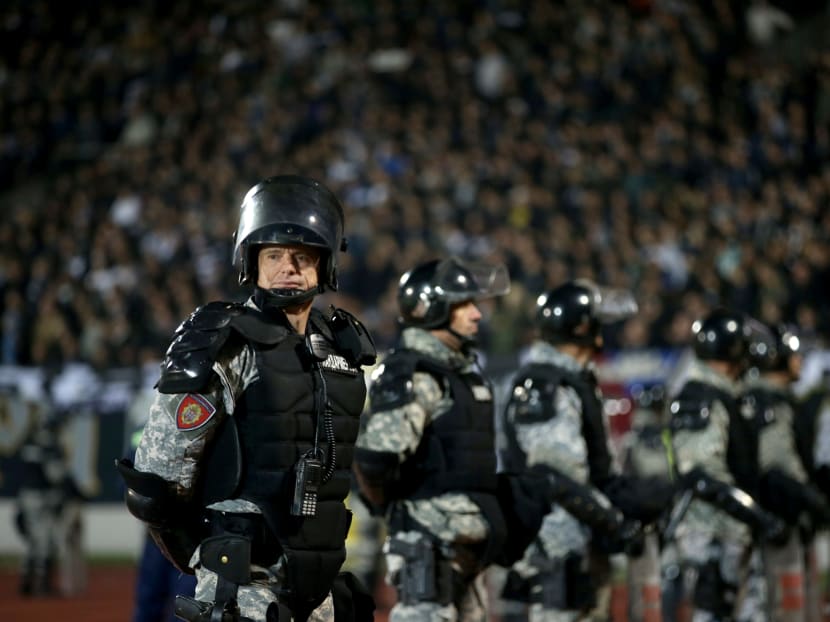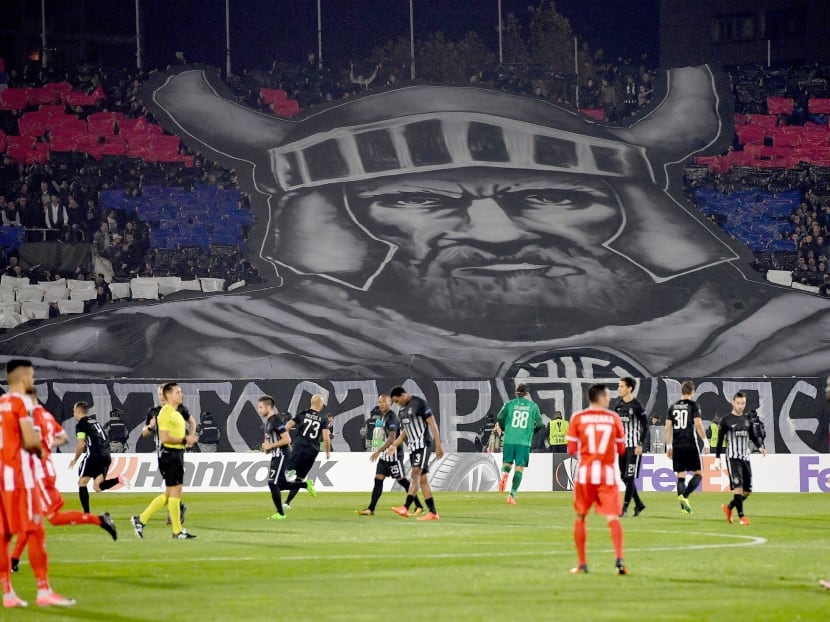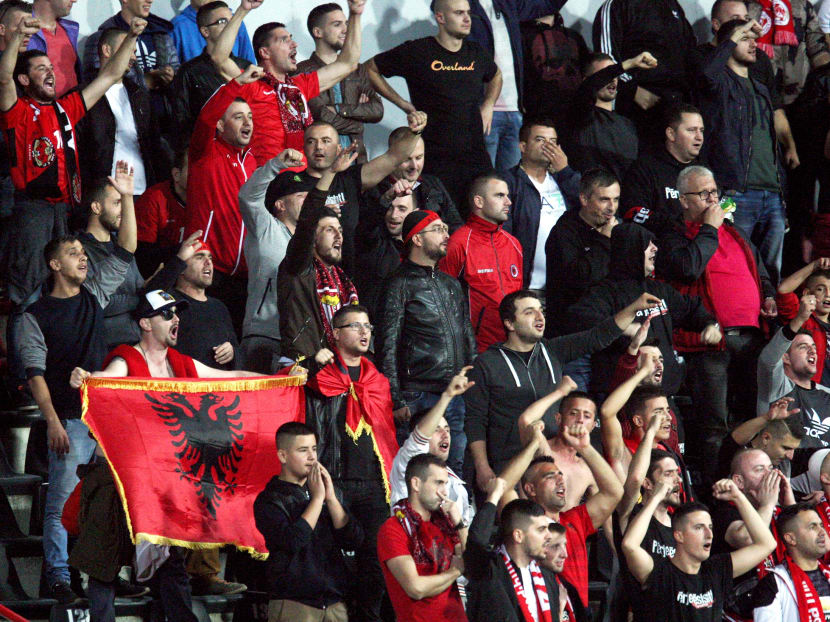A night in Belgrade with an undercover crowd monitor: ‘Try to act casual’
BELGRADE (Serbia) — At the appointed hour, the man picked up his phone, sat down on the couch in his hotel, and dialed the number.



BELGRADE (Serbia) — At the appointed hour, the man picked up his phone, sat down on the couch in his hotel, and dialed the number.
“Yes, hello, I’m calling you on behalf of Fare,” he said, dropping the name of a network based in London that fights discrimination in world soccer. “Just to inform you, I will be the matchday observer tonight in Belgrade. We have done some research. Of course, we all know it’s a high-risk match.”
The match in question, set to begin a few hours later, was a Europa League contest last Thursday (Nov 2) between Partizan Belgrade of Serbia and Skenderbeu of Albania. The person on the other line was the Uefa delegate assigned to supervise proceedings at the stadium. And the so-called risks? They were abundant, including the potential for displays of racism, political extremism and homophobia.
Two weeks earlier, the same teams had met in Albania, and Uefa, which governs soccer in Europe, later had cited a report documenting “racist behavior” and “illicit chants” by Skenderbeu fans when it fined the club US$70,000 (S$95,000).
Inside the hotel last week, hours before the rematch in Serbia, the man from Fare finished the call and prepared to head to Partizan Stadium. He would work that night as an anonymous observer, one of the dozens trained by Fare to notice everything from flags and banners to chants and slogans that can merit punishment for violating Uefa’s disciplinary code. Since 2013, Fare has monitored hundreds of games each year in Europe, quietly dispatching its monitors, with Uefa’s blessing, to both club and international matches where incidents are likely.
Fare’s work has become more prominent and influential in recent years, as calls to eliminate all forms of discrimination from soccer stadiums have grown louder and more urgent. Next summer in Russia, anonymous Fare observers will for the first time be present in the stands at every match of the World Cup.
I joined the Fare observer in the stands in Belgrade to see first-hand how the program works. The observer asked that his identity be kept secret so that he could continue to do his job.
Today, Fare has approximately 240 volunteer observers worldwide. On match day, they also were in the stands at five other Europa League games – in Croatia, the Czech Republic, Italy, Romania, and Russia. But the match in Serbia was the one Fare officials viewed most warily.
“You never know what they might prepare for a game,” the observer said of the fans as he packed a powerful camera able to photograph and film even the farthest reaches of the stadium.
Soccer in the Balkans, at every level, is inextricably tied with national identity, and this game would be no different. Ethnic tensions still simmer between several of the countries – the legacy of a brutal ethnic war in the region during the 1990s – and the memory of a disastrous Euro 2016 qualifying match two years ago at Partizan Stadium between the national teams of Serbia and Albania is a reminder of how they can boil over.
That match descended into chaos when a drone carrying a nationalist Albanian flag hovered over the field; when a Serbian player pulled it to the ground, the reaction sparked fighting on the field between not only the teams but also pitch-invading fans.
Last month, when Partizan and Skenderbeu played in Albania, a Fare observer recorded the home fans chanting, “Serbs must be killed, destroyed, slaughtered.” As a result of Fare’s documentation, Uefa, in addition to the US$70,000 fine, ordered Skenderbeu to play its next Europa match behind closed doors.
The observer on Thursday was monitoring his 21st match. The introductory call to the Uefa delegate signaled the start of his night; after the game he would file a full report to Fare headquarters. A graduate student in his mid-20s, he wore nondescript slacks and a jacket, following orders from Fare to blend into the crowd. Observers, for example, avoid wearing sneakers from New Balance, whose N logo has been co-opted by neo-Nazis for the last decade.
“You just try to act casual,” he said. “We’re not the CIA.”
Still, observers must stay vigilant. Fans in some countries, angry that their clubs are being punished, have tried to find and harass Fare observers at matches. A couple of years ago in Poland, one had to call the police after being identified and menacingly approached by fans after a match.
The observer therefore moved carefully through the crowd outside the stadium before the game on Thursday, looking for early signs of turbulence. But things were oddly calm. Fans stood around eating seeds. Police officers wearing body armor shuffled in place, looking bored.
Monitoring a game, it became clear, demanded a subtle touch and thespian manner: throughout the night, the observer made token glances toward the action on the field – snapping some photographs of the game, and casually clapping for the home team – before surreptitiously training his focus back on the ultras.
Early on he spotted a banner that read “South Guard,” with the O replaced by a Celtic cross, a symbol widely used by neo-Nazis to denote the concept of white supremacy. The fans on Thursday, however, had haphazardly obscured the cross with some tape, so the observer reluctantly ignored it. A suspicious skull on another banner was eventually deemed to be harmless, too.
Fare this summer released a “Global Guide to Discriminatory Practices in Football”, a booklet that is essentially a 75-page picture encyclopedia of slurs and offensive symbols from around the world. But observers are constantly evaluating new material on the fly.
Minutes before kickoff, for example, Partizan’s ultras unveiled an enormous graphic banner depicting Lazar Hrebeljanovic, a Serbian ruler who was killed in 1389 in the Battle of Kosovo while fighting an invading Ottoman army. As it fluttered across the stands, the fans belted out an old Serbian war march.
It was the sort of abstruse display that reinforced the value of observers who possess expertise in local politics, history and culture. The observer determined that while the display was clearly meant to provoke the Albanians, it did not cross the threshold of discrimination.
“It’s provocative, but if it’s not amplified by a further message, then it’s not enough,” Mr Pavel Klymenko, the coordinator of Fare’s observer program, said of the banner. “We can report what we think things mean, but in strictly legal terms, we have to prove what the intention was, what the motive was, how the victims were affected.”
In the 2014-2015 season, Fare recorded incidents at 47 of the 113 matches it reviewed in person. In the 2015-2016 season, there were 20 incidents recorded at 188 matches, and in the 2016-2017 season, there were 25 incidents at 114 matches, according to the organization.
Deterring discriminatory behavior, the organization knows, is just a first step. “Changing their attitudes will take way longer, take way more time,” Mr Klymenko said.
The fruits of this principle of deterrence were on view Thursday night. The Partizan ultras yelled the phrase “Kosovo is Serbia!” repeatedly, at one point engaging the entire stadium in a booming, call-and-response rendition of the chant. But this, too, was deemed within the bounds of acceptability, as it was seen to fall within the realm of political expression. Otherwise, there was nothing. Partizan scored in each half, the minutes ticked off the clock, and the observer seemed slightly dumbfounded, and a bit delighted, that no incidents occurred.
At the final whistle, the crowd detonated a euphoric shout, and the home players left the field to joyous singing and applause. Minutes later, they reappeared, half-undressed, and waved their arms around as the fans continued to sing. It was an affecting tableau, and the Fare observer looked content.
“Look at them,” he said. “This is perfect. This is what we want.” THE NEW YORK TIMES









